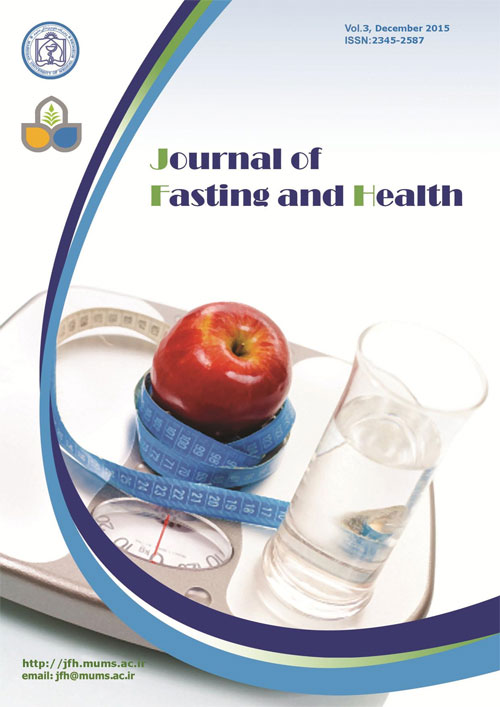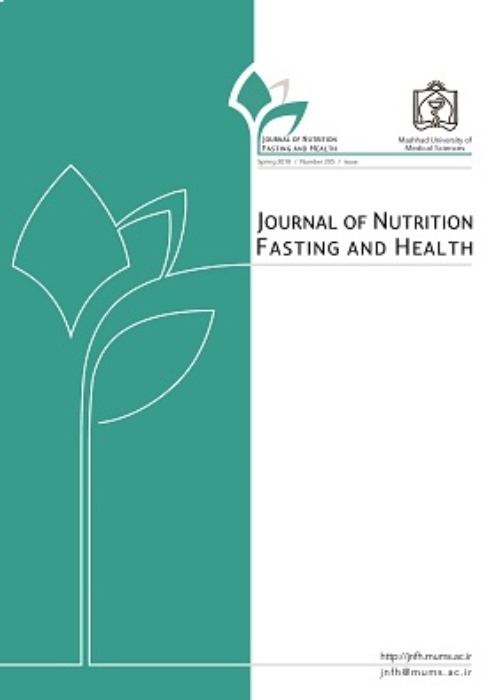فهرست مطالب

Journal of Nutrition, Fasting and Health
Volume:3 Issue: 4, Autumn 2015
- تاریخ انتشار: 1394/12/01
- تعداد عناوین: 8
-
-
Pages 138-139Pakistan International Biennial Conference on Ramadan and Health was jointly organized by Jinnah Sindh Medical University (JSMU), Baqai Institute of Diabetology and Endocrinology (BIDE), and Sir Syed Institute of Diabetes and Endocrinology (SSIDE) and was held from 9th to 11th October 2015 (Corresponding 24th to 26th Dhul Hijjah 1436 H) at Sindh Medical College campus, JSMU. Speakers from Malaysia, Iran and United Arab Emirates along with Pakistani scientists had presented their research works regarding the effect of Ramadan fasting on different diseases. Prof Dr. Syed Muhammad Tariq Rafi, Vice Chancellor of JSMU was the Parton-in-Chief along with Prof Dr. Nazeer Khan from JSMU as the chairperson and Prof. Muhammad Yakoob Ahmedani from (BIDE) & Prof Muhammad Zaman Shaikh from (SSIDE) as co-chairpersons of the conference. International renowned speaker: Prof. Fereidoun Azizi, Shaheed Beheshti University of Medical Sciences, Iran; Prof. Mafauzy Mohamed, University Sains Malaysia, Malaysia, Dr. Mohsen Nematy, Mashad University of Medical Sciences Mashad, Iran and Prof. Abdul Jabbar from UAE presented their research works regarding Ramadan and Health. Conference was comprised of eight different sessions. Forty papers were presented by national and international speakers regarding the effect of Ramadan fasting on different diseases. More than four hundred (400) participants registered in this international conference. Pre-conference workshops on ‘Management of Diabetic Patients Who Fast during Holy Month of Ramadan’ were organized at three institutes on 9th Oct, 2015. Prof. Fereidoun Azizi, was the facilitator at JSMU, Prof. Muhammad Yakoob Ahmedani and Prof. Muhammad Zaman Shaikh were the facilitators at BIDE and SSIDE, respectively. Inauguration ceremony was held at the evening of 9th October, 2015 at Regent Plaza, Karachi. Honorable Jam Mehtab Hussain Dahar (Minister of Health, Government of Sindh) was the Chief Guest and Sardar Yaseen Malik (Chief Executive Officer of Hilton Pharma) was the Guest of Honor. Leading experts of Diabetology and other field of medicine from all over the Pakistan i.e. Prof. Abdus Samad Shera, Dr. Mohammad Yaqoob Ahmedani, Dr. Khadija Irfan Khawaja, Prof. Abdul Basit, Prof. Muhammad Zaman Shaikh, Dr. A.H Amir, Prof. Aasim Ahmed, Prof Nazli Hossain, Dr. Mohammad Wasey Shakir, Prof. Zafar Saeed Saify, Dr. Syed Abbas Raza, Dr. Shabeenaz Masood, Dr. Qamer Minhas, Dr. Saif-ul-Haque, Dr. Rubina Hakeem and Dr. Mussarat Riaz presented their findings on effect of Ramadan fasting and its impact on human health. Four sessions were designated for undergraduate and postgraduate students’ presentation. Panel discussion was also organized at last day of conference in which participants, speakers and students shared their views and identify the flaws of the conference and expressed their opinions for the future conferences. In the closing ceremony Prof Syed Muhammad Tariq Rafi distributed the shields to speakers, organizers of the conference, and prizes to best three contributed papers of the students decided by the jury. Abstracts of the conference presentations will be published in the Annals of Jinnah Sindh Medical University, July-December 2015; 1(2).Keywords: Conference, ramadan, Health
-
Pages 140-143
-
Pages 144-147Ramadan fasting predispose multiple sclerosis (MS) patients to a great challenge. Clinicians should have practical knowledge about the effects of fasting on MS. A mini-symposium was held in 2013 to answer the common questions about fasting in MS patients. In current review we present a summary of the mentioned mini-symposium.Generally, fasting is possible for most stable MS patients. Thorough monitoring of symptoms, proper adjustment of drug regimens, as well as, providing patients with evidences on MS and fasting are inevitable parts of management. Data from experimental studies proposed that calorie restriction prior to disease induction ameliorated disease severity by reducing inflammation and demyelination. According to the results of the mini-symposium, fasting doesn’t have adverse effects on disease course in patients with mild disability (Expanded Disability Status Scale (EDSS) score ≤3). There was a general consensus that during fasting (especially in summer), some MS symptoms (such as dizziness, fatigue, fatigue perception, cognitive problems, spasticity, vision, weakness, gait, and balance) may exacerbate. However, they return to normal levels during feasting period. A majority of experts did not recommend fasting to patients: with EDSS score of 7 or more, during attacks, with active disease or coagulopathy; on high doses of anti-spastics, corticosteroids, and anti-convulsants.Keywords: Islamic fasting, Multiple sclerosis, Calorie restriction, Expanded Disability Status Scale (EDSS)
-
Pages 148-155In the religion of Islam, fasting is obligatory for healthy adults during Ramadan. Millions of Muslims around the world practice fasting in this holy month which may cause different metabolic and hormonal changes due to the restrictions in regular caloric intake. This article was aimed to review some possible effects of Ramadan fasting on the endocrine system which has a great impact on physiological and cellular processes through a wide variety of hormones. Despite various studies regarding the impact of Islamic fasting on a number of hormonal values, yet there is not any obvious consensus on its impact on human health. In conclusion, this article recommended normal people to continue fasting during this holy month because despite the modifications that occur in the secretion pattern of some hormones, it causes no major alteration in the health of normal subjects; it is also effective for maintenance of remission in some diseases.Keywords: ramadan, Fasting, Endocrine, Hormone
-
Pages 156-165Ramadan fasting is specific intermittent fasting comprising significant changes in routine lifestyle pattern and may affect body homeostasis and metabolism. In spite of several studies conducted on the effects of Ramadan fasting on various aspects of health and disease, because of heterogeneity in methodology and procedures (sometimes inevitable), a comprehensive concluding for reliable results as in most conditions is impossible. Based on basic studies and those have been conducted in this field, this paper suggests a checklist contains, as far as possible, important factors to be considered in designing, interpreting and comparing the results of Ramadan fasting studies. Accordingly, circadian rhythm, season/latitude sensitivity, serum osmolarity and, lifestyle changes (including dietary intakes, physical activity, sleep quality and duration, smoking and, etc.) may be of great importance. Also, a close definition of the number of fasting days and it consecutively or alternatively must be presented with reference to sex. Appropriate time points for blood/urine sampling would be varied case by case.Keywords: Ramadan Fasting, Fasting, Guideline
-
Pages 166-168Fasting, that is usually described as abstinence from all food and drink for a period of time, has been experienced for ages. Health, protest, religious expressions of devotion and purification are the most important reasons for fasting. Many changes occur in the body during fasting including metabolic, mineral, hormonal, immunological and psychological. Its use as one of the oldest therapies among human populations has been recognized. Also its effects on many abnormalities for medical and therapeutic purposes have been investigated in animals and human. Recently studies have considered its role in apoptosis (or programmed cell death), and subsequently its outcome on the cell processes. Apoptosis is a dynamic process that occurs in multicellular organisms and is described by changes in many cellular processes, and biochemical alterations that lead to morphological cell changes, self-destruction and cell death. It also limits the accumulation of tumor cells. In this mini-review article the relationship between fasting and apoptosis has been summarized.Keywords: Fasting, Apoptosis, Cell
-
Pages 169-176While fasting has been practiced for centuries, its beneficial effects was unknown until recently. This review tries to analyze the current literature of how fasting and intermittent fasting (IF) could affect clinical pathological parameters, learning, mood and brain plasticity. The effects of different ways of fasting on metabolism and stress were also explored. Animal experiments have elucidated fasting and IF could exert positive effects on learning, mood and brain, plus metabolic functions such lowering plasma glucose and insulin level and improvement in lipid metabolism (reduced visceral fat tissue and increased plasma adiponectin level), and an increased resistance to stress. Thus, more clinical studies are necessary to test the effectiveness of fasting and IF in preventing different diseases.Keywords: Fasting, Experimental animals, Intermittent
-
Pages 177-182BackgroundFasting is a common ingredient of naturopathic prescription in India. However no studies have been conducted to establish the use, approach of naturopathy physicians towards fasting. The present study, a cross sectional survey was conducted to assess the attitude, use, belief and understanding about therapeutic fasting among the naturopathy physicians in India.MethodsA 12 item e-mail based questionnaire was sent among 334 naturopathy physicians, which were designed to obtain demographic data, practice characteristics and multiple choice and multiple response close-ended questions along with an open-response final question. Survey questionnaire data was analyzed using descriptive statistics via frequency distribution and cross tabulations.ResultsThe survey got a response rate of 32.12% (n=257). Majority of the respondents were private practitioners with an average experience of 5 years. 50% of the total population confirms the use of fasting in their daily prescription which is mostly for 1-5 days (54%) and for all diseases (38.5%). Physicians mostly prescribe short term mono fasting with fruits or juices (42.8%) along with all other modalities (61.5%) to get desired effect. The end results of fasting therapy was quoted as satisfactory (51.7%) whereas the misconceptions of the patients was a challenge for 1/3rd and most of them find it easy to administer in adults (85%).ConclusionNaturopathy physicians use fasting as a first line management in almost all chronic and acute diseases. However there is a need for strengthening the evidence based practice to bestow better care.Keywords: Fasting, Naturopathy, BNYS, Calorie restriction, Diet therapy


